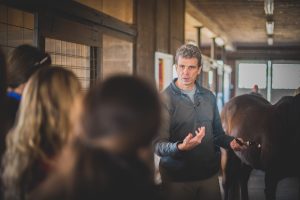Equine eye health
Vision problems are common in horses and can severely affect the animal’s life and performance. A range of factors can cause these problems, because a horse’s eyes are large, delicate, and relatively exposed on the head.
Our lab studies some of the most common eye conditions affecting horses, including:
- Recurrent uveitis: a chronic form of inflammation that causes repeated bouts of inflammation and is the leading cause of horse blindness. Download our fact sheet.
- Fungal keratitis: an infection caused when a fungus, normally present on the surface of the eye, invades the cornea after some trauma (like a cut to the eye), causing inflammation and permanent damage in some cases. We collaborate with Drs. Cubeta and Ignazio in the NC State Center of Integrated Fungal Research (CIFR)
- Immune mediated keratitis: a non-infectious disease thought to be caused by an overly-intense response of the horse’s immune system to foreign cells or other objects in the eye.
- Corneal ulceration: an injury to the outer layer of the eye that can become infected and cause serious health concerns.

If untreated, these conditions can cause severe eye problems or even blindness, but early diagnosis and treatment can minimize or avoid permanent eye damage. So, we spend a lot of time helping heal horses in the clinic and doing scientific research to find and improve solutions.
For example, at the NCSU Veterinary Hospital, we perform ocular imaging using high-frequency ultrasound and optical coherence tomography (both are advanced types of imaging technology) that allows us to see a horse’s eye in great detail.
We are particularly interested in two new approaches:
- Gene therapy, which aims to replace the eye’s naturally-inherited missing or faulty genes with new and normal genes; and,
- Sustained-release drug delivery, which reduces patient stress and improves treatment outcomes by avoiding the need to frequently reapply medications.
To advance these techniques, we have established real, active collaborations with the Center for Integrated Fungal Research at NCSU to better understand how fungal keratitis progresses and build innovative treatments to stop the disease, and with The Schnabel Lab at NCSU to pioneer ocular stem cell therapies for horses.
